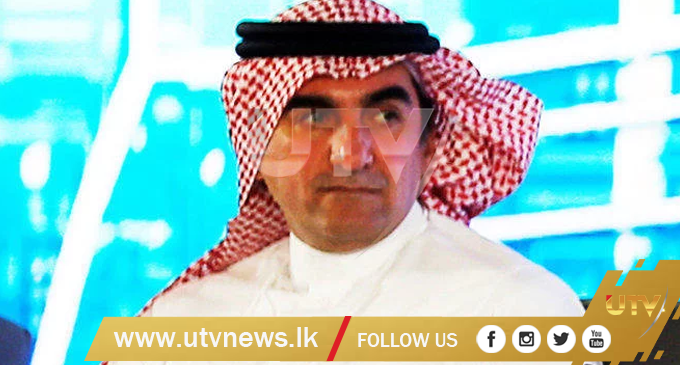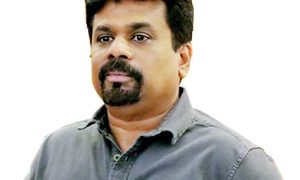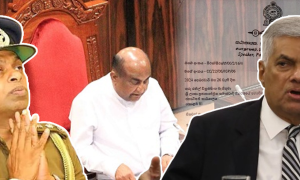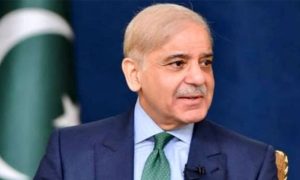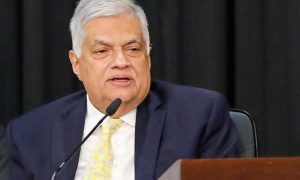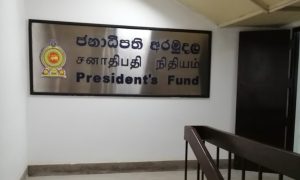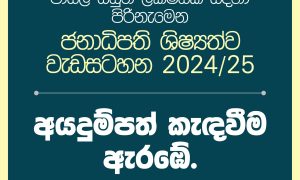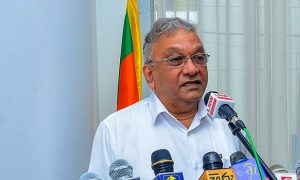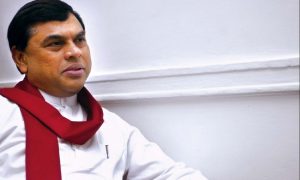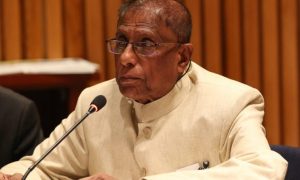UTV | COLOMBO – As the clocks ticked to midnight in New York’s Plaza Hotel, Yasir Al-Rumayyan was nearing the end of a busy day in a hectic week. But there was one event he simply had to attend, mainly because it might just involve the complete transformation of the renewable energy industry.
In the luxurious hotel’s corridors, just outside the Monroe Suite, the managing director and chief executive of Saudi Arabia’s Public Investment Fund was waiting, along with a watchful security contingent and an expectant media pack, for the arrival of Crown Prince Mohammed bin Salman and an announcement that everyone had been assured was “big.”
Al-Rumayyan shook some hands and took some congratulations on the successful interview he had done that afternoon with Maria Bartiromo, the anchor for Fox Business Network TV channel. He looked tired, but accomplished.
In that interview, he had once again committed PIF to becoming a “global investment powerhouse” with a staggering $2 trillion in assets under management by 2030, and when the small crowd of journalists and cameramen were shown into the presentation suite, it was obvious that the next phase toward achieving that ambition would begin that very evening.
Al-Rumayyan stood locked in contemplation alongside Khalid Al-Falih, the Saudi minister of energy, as the Crown Prince and Masayoshi Son, the founder and chief executive of Japanese hi-tech finance house SoftBank, unveiled an agreement to put Saudi Arabia, and PIF, in charge of the biggest investment ever in solar energy.
The $200 billion investment in the sun-rich Kingdom could give Saudi Arabia the impetus to lead the development of renewable energy from solar power, boost the economy with growth and thousands of jobs, and save it $40 billion a year in energy bills.
It was exactly the kind of transformational deal he had described earlier that day. “We want to enable new sectors and new industries, and make them more practical. Some of the new ideas are really great ideas, but they are not practical,” he told Bartiromo.
Just a few years ago solar energy might have fallen into the “not practical” category, but — with PIF and SoftBank’s investment — it might just be reaching the tipping point of practicality. This was what he had meant when he said: “We want to present new opportunities to reshape the global economy.”
Al-Rumayyan has been chosen as the man at the sharp financial end of the ambitious Vision 2030 strategy to transform the economy of Saudi Arabia away from oil dependency. His education in Saudi Arabia was rounded off at Harvard Business School, and the top job at PIF came after various roles with Saudi financial institutions and market authorities.
He was made managing director and chief executive of PIF just a few months after the Crown Prince took charge of the once-sleepy pensions arm for the Saudi government, and began to change it radically.
“The Crown Prince is a great visionary and he looked at the things that he thought we should be looking at, and I agreed with him totally,” said Al-Rumayyan.
Virtually everything has changed at PIF since then. It has a new ambition: To be the biggest single investor in the world measured by assets under management. It has a new investment strategy: To invest in the future. And it has a new corporate culture: To hire the best and the brightest investment minds from around the world to implement the Vision 2030 strategy.
On the first target, he mapped out how PIF would get to the $2 trillion level by 2030. “A year ago, we had $150 billion assets under management. Last September that stood at $250 billion … By 2020 we should be $400 billion and by 2030 we should be $2 trillion. So how we achieve the target is, of course, challenging, but it’s very much doable,” he said.
PIF’s Vision Realization Program commits it to higher performance targets for the 80-odd companies, of which about 20 are quoted, that are in its biggest pool of assets, the Saudi domestic funds. These had been delivering a return of 3 percent, but this has already increased to between 4 and 5 percent, Al-Rumayyan said.
“We were previously a passive investor, but now we’re more active,” he added.
The second way to help get to the $2 trillion figure is via the use of funds from the government in the form of cash from the enormous sell-off of government companies set to begin soon. “The government will keep investing capital via the proceeds of the privatization program. That is another good way to increase our assets under management,” he said, pointing out that PIF was not obliged to pay anything back to the government in dividends.
That pot would include the proceeds from the forthcoming initial public offering of Saudi Aramco, billed as the biggest single IPO in history. “So that’s a minimum of maybe $100 billion coming to us, maybe more, not depending on the valuation only, I would say, but on the size of the IPO we’ll be offering,” he said.
The third technique to get to the $2 trillion goal is through the new, aggressive investment strategy PIF has adopted under Al-Rumayyan. He reeled off a list of the biggest investments made in the past couple of years: Uber, SoftBank Vision Fund (the $100 billion hi-tech investment fund set up and managed by the Japanese bank with a $45 billion PIF investment), Blackstone, and the latest — Magic Leap, the Californian developer of “mixed reality” technology, which he called “really, a great company.”
“All these have outstanding growth rates. They are very disruptive and will add a lot of value to our portfolio,” Al-Rumayyan said.
“So, add it all up, and the $2 trillion is a conservative estimate,” he judged.
Not much else about the new PIF can be called conservative. The partnership with the hi-tech Vision Fund is central to the strategy. “Traditionally our historical portfolio was in Saudi equities and fixed income with low or even negative returns. It was all in conventional investments.
“But we see new trends coming to the future want to invest in the future, like robotics and even autonomous cars. It’s coming, it’s here. I know we had an incident recently (the fatal accident with an autonomous Uber vehicle in Arizona, US) but it’s one incident out of 30 million hours of test driving. In the grand scheme it’s really a fraction of a fraction of a percentage,” he added enthusiastically.
Data sciences will also be a focus of the new PIF strategy. “With the Internet of things, everything will be talking to everything else and the amount of data will be unprecedented. People will know what you’re buying, what you’re doing, your preferences even without you knowing about it,” he said.
Medical investment will also be to the fore. “If we’re going to have prosperity people are going to need to have greater lifespans and ages. All these things will be the focus of our investments. In addition to the greater impact it will have on our life, it is going to be lucrative,” Al-Rumayyan said.
PIF has not given up entirely on conventional investment. Al-Rumayyan pointed to the recent stake in AccorHotels as an example of investment in a fast-growing conventional business, but a much bigger focus is on infrastructure, via its $20 billion share of Blackstone’s $40-$50 billion US fund for US infrastructure.
“It needs to be upgraded. So we created the largest fund in the history of infrastructure investment. It will close in the coming month or two, and then we can start work. Streets, bridges, pipelines, tunnels, even airports — all need to be upgraded in the US and internationally. With the political will we have from the administration I think it’s a really good opportunity for us to be here,” he said.
And, of course, there are the huge infrastructure investments under way back home in Saudi Arabia. PIF is running three of the big “giga projects” — the Neom development, the Red Sea Resort and the Al Qidiya leisure complex outside Riyadh.
“Giga projects are excellent investment ideas. The growth rates in the Saudi economy will be really great and bigger than the past five years,” he said.
Managing these projects presents a challenge for PIF, which just a couple of years ago had a staff of only 40. Now, Al-Rumayyan said, it employs 240, expected to rise to 480 by the end of the year, with new offices planned in the US, London and Tokyo. This is in addition to the large number of investment bank advisers and consultants PIF uses.
One of the challenges, he said, lies in finding the right people to partner with, which he compared to being an orchestral conductor. “Sometimes the biggest challenge is to get people to play together,” he said.
But he is convinced that the world can be persuaded of the opportunities presented by the new-look Saudi Arabia.
“It is one of the most stable states in the region with 100 years of track record. Look at some of the countries around us. Some other states attract FDI but are less stable than Saudi.
“You have the history, you have the infrastructure, you have the rules and regulations, you have the enforcement of the law, especially if you look at what we’ve been doing lately with the war on corruption. We’re trying to pave the way for anybody to come in and feel comfortable that they know what it is they’re getting themselves into,” he added.
He is also convinced that the bold new Saudi world has the support of most people in the Kingdom. “Of course there is change, but it is all about positive changes and most of the people in Saudi Arabia want that. Now we’re seeing it and now we all want to participate in it. The year 2018 will be a great year for us and I think we’ll see a lot of good things,” he said.

